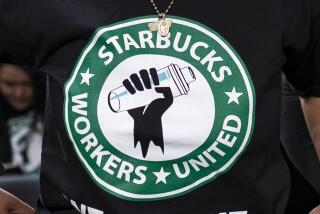Starbucks Is Looking South
- Share via
SAN JUAN, Puerto Rico — Starbucks Corp. is opening its first chain of stores here next month, spreading into Latin America, where coffee growing is a matter of pride and a 50-cent cafe con leche is part of the culture.
But the Seattle-based company is trusting in a blend that has given it more than $2.6 billion in sales and a foothold in 26 countries--a strong brew, local beans and a cafe atmosphere.
Starbucks plans to charge about the same prices in Puerto Rico and Mexico--where it also will begin opening stores next month--as it does in the United States, where a small coffee costs $1.68 and a large specialty coffee drink runs more than $5.
“I’m not sure I’ll go there.... I can make coffee at home,” said Carlos Rodriguez, a 48-year-old San Juan attorney. “I just wonder whether the locals will associate [Starbucks] with typical American coffee--which is just bad.”
Peter Maslen, president of Starbucks Coffee International, said Thursday that more than 10 stores will open in Puerto Rico, the first Sept. 7, and 14 in Mexico, one of the world’s top 10 coffee exporters.
The chain plans to offer premium-bean coffee and a “coffee experience.”
“Puerto Ricans have a tremendous passion for coffee, and the coffee is good,” Maslen said. “That makes Puerto Rico a great place for Starbucks.”
The company also is looking at opening sites in Venezuela, Brazil, Colombia and Costa Rica-- all countries steeped in coffee tradition. Worldwide, Starbucks operates about 6,500 locations in North America, Asia and Europe. The firm sells coffee drinks and beans, pastries, as well as coffee makers, grinders and mugs.
“Bring it on,” said Jean Paul Coupal, owner of Venezuela’s gourmet Arabica Coffee Co. franchise, which charges 70 cents for an espresso with milk.
“In countries where there is a culture of espresso, like Venezuela, Brazil and Argentina, Starbucks won’t have any sort of success,” he said, “There’s no room for mediocrity here.”
Coffee, the most widely traded commodity after oil, has been a bedrock of Latin American economies. The $50-billion industry employs 20 million people around the world.
But market prices have fallen to an eight-year low of about 50 cents a pound, forcing small growers to enter partnerships with larger companies. Starbucks said it pays at least $1.26 a pound for coffee from growers.
As part of its venture in Puerto Rico and Mexico, Starbucks said it would buy beans from local growers, but wouldn’t say for how much or from which growers.
More to Read
Inside the business of entertainment
The Wide Shot brings you news, analysis and insights on everything from streaming wars to production — and what it all means for the future.
You may occasionally receive promotional content from the Los Angeles Times.










